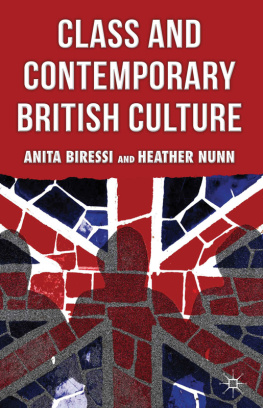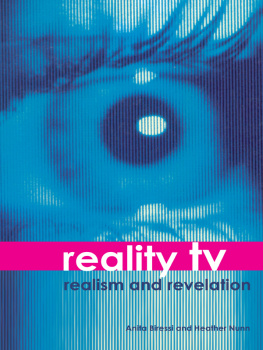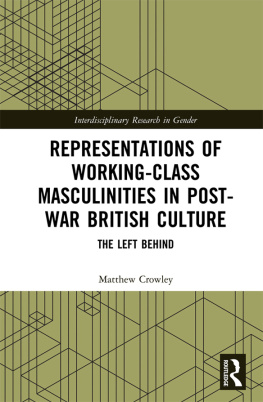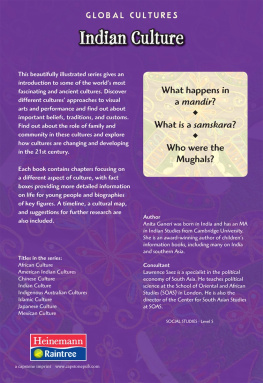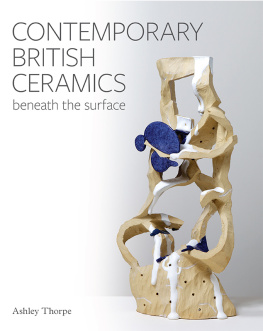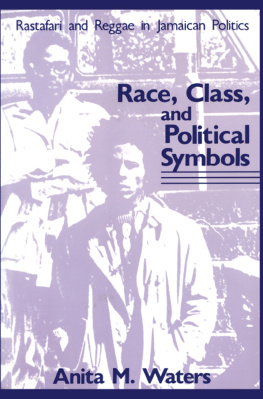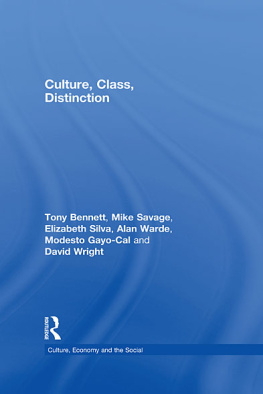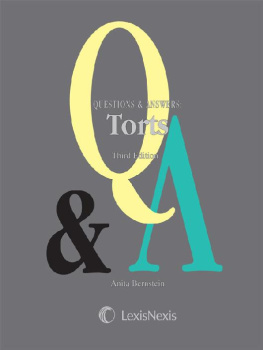Biressi Anita - Class and Contemporary British Culture
Here you can read online Biressi Anita - Class and Contemporary British Culture full text of the book (entire story) in english for free. Download pdf and epub, get meaning, cover and reviews about this ebook. City: Basingstoke;United Kingdom, year: 2013, publisher: Palgrave Macmillan, genre: Politics. Description of the work, (preface) as well as reviews are available. Best literature library LitArk.com created for fans of good reading and offers a wide selection of genres:
Romance novel
Science fiction
Adventure
Detective
Science
History
Home and family
Prose
Art
Politics
Computer
Non-fiction
Religion
Business
Children
Humor
Choose a favorite category and find really read worthwhile books. Enjoy immersion in the world of imagination, feel the emotions of the characters or learn something new for yourself, make an fascinating discovery.
- Book:Class and Contemporary British Culture
- Author:
- Publisher:Palgrave Macmillan
- Genre:
- Year:2013
- City:Basingstoke;United Kingdom
- Rating:4 / 5
- Favourites:Add to favourites
- Your mark:
- 80
- 1
- 2
- 3
- 4
- 5
Class and Contemporary British Culture: summary, description and annotation
We offer to read an annotation, description, summary or preface (depends on what the author of the book "Class and Contemporary British Culture" wrote himself). If you haven't found the necessary information about the book — write in the comments, we will try to find it.
Class and Contemporary British Culture — read online for free the complete book (whole text) full work
Below is the text of the book, divided by pages. System saving the place of the last page read, allows you to conveniently read the book "Class and Contemporary British Culture" online for free, without having to search again every time where you left off. Put a bookmark, and you can go to the page where you finished reading at any time.
Font size:
Interval:
Bookmark:
Class and Contemporary British Culture
Class and Contemporary British Culture
Anita Biressi
Reader in Media Cultures, University of Roehampton, UK
and
Heather Nunn
Professor of Culture and Politics, University of Roehampton, UK


Anita Biressi and Heather Nunn 2013
All rights reserved. No reproduction, copy or transmission of this publication may be made without written permission.
No portion of this publication may be reproduced, copied or transmitted save with written permission or in accordance with the provisions of the Copyright, Designs and Patents Act 1988, or under the terms of any licence permitting limited copying issued by the Copyright Licensing Agency, Saffron House, 610 Kirby Street, London EC1N 8TS.
Any person who does any unauthorized act in relation to this publication may be liable to criminal prosecution and civil claims for damages.
The authors have asserted their rights to be identified as the authors of this work in accordance with the Copyright, Designs and Patents Act 1988.
First published 2013 by
PALGRAVE MACMILLAN
Palgrave Macmillan in the UK is an imprint of Macmillan Publishers Limited, registered in England, company number 785998, of Houndmills, Basingstoke, Hampshire RG21 6XS.
Palgrave Macmillan in the US is a division of St Martins Press LLC,
175 Fifth Avenue, New York, NY 10010.
Palgrave Macmillan is the global academic imprint of the above companies and has companies and representatives throughout the world.
Palgrave and Macmillan are registered trademarks in the United States, the United Kingdom, Europe and other countries.
ISBN 9780230240568
This book is printed on paper suitable for recycling and made from fully managed and sustained forest sources. Logging, pulping and manufacturing processes are expected to conform to the environmental regulations of the country of origin.
A catalogue record for this book is available from the British Library.
A catalog record for this book is available from the Library of Congress.
10 9 8 7 6 5 4 3 2 1
22 21 20 19 18 17 16 15 14 13
For our parents
Ruth Lena Biressi and Alfredo Carlo Biressi
Sylvia Irene Winifred Nunn and Herbert Richard Hanslip Nunn
Contents
Figures
Acknowledgements
This book could not have been written without the support of colleagues, former colleagues and friends at the University of Roehampton and at many other institutions. We extend special thanks to Roehampton for the award of a research sabbatical to each of the authors. We are also grateful for the friendly and painstaking assistance of Suzy Hyde and her colleagues at Roehampton Media Services in tracking down many of the broadcast resources referred to here. Staff at the British Newspaper Library at Colindale, North London, the Sunday Telegraph and the Advertising Standards Authority also provided information and advice.
During the past few years we have been fortunate enough to have been given many opportunities to present work-in-progress at conferences, symposia and research centres and have appreciated fellow participants informed and insightful feedback. Special mentions should go to Jane Arthurs, Helen Wood, Beverley Skeggs, Patricia Holland, Diane Negra, Deborah Philips, Jonathan Rutherford, Milly Williamson, Gareth Palmer, Yvonne Tasker, Candida Yates, Caroline Bainbridge, Julie Doyle, Irmi Karl, Bronwen Thomas, Elke Weissmann, Vicky Ball, Barry Richards, Christine Berberich, Nick Couldry, Jeremy Gilbert, Imogen Tyler and Jo Littler for extending invitations to present research papers, accepting conference submissions and offering feedback on research applications, personal encouragement and other kinds of invaluable support. Sally Munt, in particular, has been unfailingly enthusiastic and encouraging about the value of this project over more years than we care to recall.
We also wish to thank early mentors and former colleagues Alan OShea, Bill Schwarz, Angela McRobbie, Susannah Radstone, Andrew Blake and Sally Alexander; their own research, scholarly values and ethical commitment to cultural studies have been an inspiration and continue to inform our work.
Our thanks also go to Palgraves former Commissioning Editor Christabel Scaife and to its present Senior Commissioning Editor, Felicity Plester, who have both warmly supported this project.
We are also grateful to Kathryn White, Berni ODea and Miri Foster for their friendship and care.
has previously appeared in a different form in H. Nunn and A. Biressi (2010b). Some aspects of our discussion of class theory and cultural studies which feature in the Introduction appeared in briefer form in H. Nunn and A. Biressi (2009).
Introduction: Beginning the Work of Class and Culture
This book is about class and contemporary British culture, so perhaps we should begin by explaining what we take social class to be, for, as David Harvey (2005:31) has observed, it is a shadowy and dubious concept at the best of times. Here we understand social class as being formed through material conditions and economic (in)securities and as being shaped by early disadvantage or natal privilege and the uneven distribution of life chances and opportunities which these conditions create. But we also choose to recognise class as an ongoing social process experienced across our lifetime trajectories. For example, throughout our lives as classed subjects many of us are buffeted by a variety of changing socio-economic circumstances, which might be precipitated by family breakdown, redundancy, financial windfalls, exceptional professional success, and so on. All of these are also experienced in the wider context of economic eddies of boom, affluence and bust which impact on how we understand our current and future social roles. In addition, we will argue that classed subjects are shaped by the classed judgements of others and by prevailing political and popular discourses which often work to privilege, protect or normalise particular lifestyles, conducts and values. Bearing these various processes of class formation in mind, this book considers how culture works to classify, label and formulate class judgements. It aims to confront the ways in which culture articulates, frames, organises and produces stories about social class, class difference and its various attachments. These attachments include those explicitly connected to economic conditions and the material life (consumption, social mobility, social exclusions, work and leisure) and those linked to the interior life (hope, pride, shame, aspiration, fear and resentment), although it will be immediately obvious that these necessarily overlap. This is not a study of British politics or economics, but it does locate cultural analysis within political and socio-economic contexts. We examine the ways in which culture intersects with the political in terms of its articulation of prevailing political philosophies and economic conditions such as the free market, meritocracy, neoliberalism, affluence, recession and austerity. This is not a work of sociology, but it does aim to take into account the continuing (if fiercely debated) significance of class labels and class stratification and the conviction that British social relations continue to include relations of class.
The adjective contemporary clearly points to an inquiry into culture which is current, to its status as recent history and to its association with living memory. While this book considers the cultural landscape mostly from the perspective of the past decade or so, overall it situates this within a historical and political context bounded on one side by the arrival of Thatcherism and the political and social changes which followed in its wake. We make this move for a number of reasons. In social terms, the 1980s has been heavily cited as the decade in which already-foundering traditional class structures and class-based affiliations finally broke down, giving way to the more fluid and individualised social formations fostered by the processes of neoliberalism. In scholarly terms, within sociology, cultural studies and cognate fields, this was also the period in which the utility of class-based cultural analysis was being increasingly questioned and challenged. Finally, in personal terms, the 1980s were also the decade when both authors came to adulthood, so that our early working lives and political educations were lived and formed under Thatcherism, and our understanding of the processes of class formation was refracted through the experiences of this period. In sum, the 1980s were important for political, scholarly and personal reasons and we found, upon reflection, that these were deeply and perhaps inextricably entangled.
Next pageFont size:
Interval:
Bookmark:
Similar books «Class and Contemporary British Culture»
Look at similar books to Class and Contemporary British Culture. We have selected literature similar in name and meaning in the hope of providing readers with more options to find new, interesting, not yet read works.
Discussion, reviews of the book Class and Contemporary British Culture and just readers' own opinions. Leave your comments, write what you think about the work, its meaning or the main characters. Specify what exactly you liked and what you didn't like, and why you think so.

